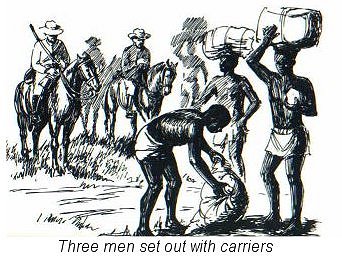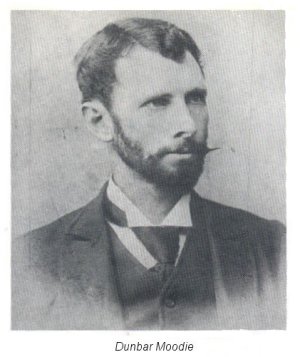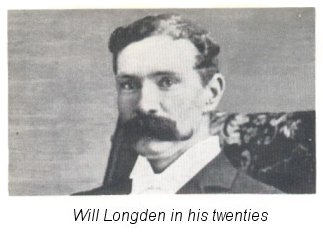In the meantime the Portuguese had built settlements at
various places along the East Coast of Africa and had made expeditions inland.
By the 17th century they had established a line of forts from Tete on the
Zambezi river to Tati on the Limpopo river, and during the 18th century they
declared that all the country between Mozambique and Angola was Portuguese.
During the 19th century they suffered setbacks from migrating warlike Bantu, but
gradually re-established themselves and formally made a treaty with Chief Mzila
of Gazaland. They erected trading stations and hoisted the Portuguese flag, and
in 1884 they proclaimed Manicaland as theirs, where Mtasa was recognised as
chief.
In 1887 the Portuguese issued an official map of Southern Africa, marking the whole of Lobengula�s territory as a Portuguese possession, but the British Government protested, and Lisbon authorities withdrew for the time being their claim to country west of the 32� East Longitude. In 1888 Paiva d�Andrada united all the gold-seekers and companies into one Companhia de Mo�ambique, and the position of the tribal leaders became insecure as Portuguese forces carried out raids to the west. It was against this background that the British, and particularly Cecil John Rhodes, became interested in the country to the east of Matabeleland where advanced missionary and trading posts had been established. The British South Africa Company, referred to as the Company or the B.S.A.Co., was granted its charter for the administration of Rhodesia by the British Government in 1889. In 1891 Rhodes met two young men, George Benjamin Dunbar Moodie aged 30 and William Matthias Longden aged 28, who were both to influence Melsetter�s story. In March 1890 Dunbar Moodie arrived by boat in Beira and travelled up the Pungwe river, and then overland to Macequece and on to the Penhalonga valley in Manicaland, where he established his camp as manager of the Sabi Ophir Gold Mining Company.
As the Pioneer Corps neared Salisbury the Portuguese claimed sovereignty over the whole of Manicaland. Three days after the flag was hoisted the Administrator, A. R. Colquhoun, and F. C. Selous reached Chief Mtasa's Kraal on the Penhalonga Range near Moodie�s camp, and Dunbar participated in the negotiations when Chief Mtasa placed himself under the protection of the B.S.A.Co., who thus gained Manicaland. Later that month Dr. Jameson and Frank Johnson arrived at Dunbar�s camp on their way to find an eastern seaport for Rhodesia, and he helped them by personally recruiting thirty carriers from nearby kraals with the liberal aid of his already legendary sjambok. In November Dr. Jameson got back to Kimberley and convinced Rhodes of the urgency of gaining a concession from Gungunyana himself, which they hoped would open the road to the sea with trade following the opening up of the east coast route. It was felt that the Portuguese would be unlikely to establish their authority over the coastline in Shangaan territory as Gungunyana�s relations with them were far from friendly. Rhodes sent Dr. Schultz to approach Gungunyana at Manhlagazi and arranged that Dr. Jameson, who was returning to Salisbury, would assemble a party to travel overland to join him. At the end of the year Jameson left Salisbury with Denis Doyle. At Penhalonga they collected Dunbar who had by then resigned from the Sabir Ophir Company, and the three set out on horseback, with carriers, on their long trek southwards.  On 19th January 1891 they crossed the Umvumvumvu river and, as they approached the higher ground near the Chimanimani Mountains, Dunbar was very taken with the agricultural prospects and looked at the country with a view to bringing settlers to this fertile area. There was then no plan for encouraging any settlement but Dunbar waxed enthusiastic about the possibility. Jameson thought the idea absurd, but recommended that Dunbar should talk to Rhodes. They carried on through the lowveld and reached the Sabi river on 5th February: �No kraal, no boats, no food, damn all�, recorded Dunbar, who then rode downstream and eventually found a native canoe which they used to ferry their possessions across. For another fortnight they struggled on through barren deserted lowveld, their horses and carriers completely exhausted and they themselves desperately ill with malaria. Eventually, forty-four days after leaving Penhalonga, they reached Manhlagazi. In a camp nearby they found a missionary couple of the American Zulu Mission, who had been stationed there for three years. Their Society (today the Rhodesian Mission American Board) approached the B.S.A.Co. for land, Rhodes offered them Silinda, and the Mount Silinda Mission was started by Wilder, Bunker and Dr. Thompson, who in 1893 were joined by others who travelled from Beira up the Buzi river and across country. Also encamped near Manhlagazi was a party of concession-hunters from the Companhia de Mo�ambique on an errand similar to Dr. Jameson�s. Dr. Schultz meantime had been negotiating with Gungunyana, who was very impressed with all that the British had done in Southern Africa. He distrusted the Portuguese, and decided to negotiate with the Company�s representatives. Gungunyana sent Dr. Jameson a slaughter ox on 4th March and they had a short formal interview which was followed by longer discussions on succeeding days.  On March 9th the Gazaland Concession was signed, in terms of
which Gungunyana ceded the commercial and mineral rights of all his country,
extending from the Limpopo to the Zambezi and including Manicaland, to the
B.S.A. Company. In return he was to receive 1 000 Martini-Henri rifles and 20000
rounds of ammunition and an annual cash subsidy to be paid in sovereigns. On March 9th the Gazaland Concession was signed, in terms of
which Gungunyana ceded the commercial and mineral rights of all his country,
extending from the Limpopo to the Zambezi and including Manicaland, to the
B.S.A. Company. In return he was to receive 1 000 Martini-Henri rifles and 20000
rounds of ammunition and an annual cash subsidy to be paid in sovereigns.Jameson was delighted at securing the treaty, but the international legality of the Concession was doubtful. The boundary dispute dragged on between Britain and Portugal for years and affected Melsetter directly both in the daily lives of its people and in the eventual effect of its settlement when most of Gungunyana�s territory was adjudged to be Portuguese. Dr. Schultz had already arranged for the arms to be delivered, and Jameson and his party, carrying the precious Concession, set off for the mouth of the Limpopo to meet the tug bringing the arms. A Portuguese gunboat was anchored alongside the tug, and Jameson hastily handed the Concession to his carrier who had been retained to take the horses overland to Delagoa Bay, with instructions to ride as hard as he could along the coast until he came to a town. Jameson�s party was searched by the Portuguese and its members were arrested as gunrunners and held as prisoners on board the gunboat until they reached the township of Delagoa Bay. There they were released and collected the treaty from the British Consul to whom the carrier had delivered it. On payment of a fine of �2 000 the arms were later released by the Portuguese and were despatched to Gungunyana. Dr. Jameson�s party was disbanded. Dunbar Moodie embarked on a boat for Durban, from where he travelled to Bethlehem in the Orange Free State, and to his cousins there he unfolded his tale of the rich farming prospects of Gazaland. Two of Gungunyana�s trusted indunas had travelled to England to satisfy the British Government that the negotiations of the Gazaland Concession were genuine and understood by Gungunyana. Denis Doyle escorted them on the trip, and on their return later in 1891 he travelled with them on a small coaster up to Delagoa Bay.  Will Longden boarded this coaster at Port Elizabeth,
planning to go as far as Durban only, but on board he met Rhodes and all his
plans were changed. In conversation Longden mentioned that he had been across
the Limpopo into Gazaland. Rhodes was immediately interested, and, after some
searching questions, asked Longden if he would go with Doyle to Gungunyana and
would stay on at Manhiagazi indefinitely as his representative, keeping the king
sweet and counteracting the machinations of others. Will Longden boarded this coaster at Port Elizabeth,
planning to go as far as Durban only, but on board he met Rhodes and all his
plans were changed. In conversation Longden mentioned that he had been across
the Limpopo into Gazaland. Rhodes was immediately interested, and, after some
searching questions, asked Longden if he would go with Doyle to Gungunyana and
would stay on at Manhiagazi indefinitely as his representative, keeping the king
sweet and counteracting the machinations of others. Longden agreed for the love of adventure, and said later that he
gave up an appointment worth �600 per annum to enter the Company�s service at
�480. At Durban the party was joined by Harrison, a trooper of the newly formed
British South Africa Police.
They disembarked at Delagoa Bay and made their way over difficult and little-known country, parts of which were occupied by hostile tribes, and in mid-October 1891 they reached the outskirts of Gungunyana�s Kraal. In due course he received them and listened with interest to the indunas� graphic tales of all they had seen on their travels to London. While the deputation was at Manhlagazi some Portuguese officials arrived to try to negotiate their own settlement with Gungunyana, but he had decided to abide by his concession to the B.S.A. Co., and turned them away. He continued, however, to argue interminably over details of the Concession with the Company�s representatives, and it took some time before the negotiations were completed. He took a great fancy to their horses, and the three white men
felt that they had no alternative but to hand them over to him. When the time
came for them to set off on the long journey back to Delagoa Bay Doyle was
seriously ill with blackwater fever and had to be carried by relays of bearers
while Longden and Harrison walked.
At Delagoa Bay Doyle was placed on board ship, and Longden met
him casually once again some years later.
Longden got another horse and returned to Manhlagazi, where he remained, the only white man, for eight months. In the middle of 1892 he received a message by runner with orders from Rhodes for him to return. He learned later that the presence of a B.S.A. Company representative at Gungunyana�s kraal was an irritation to the Portuguese, and the British Government, wishing to maintain cordial relations with the Portuguese Government, brought pressure to bear and instructed Rhodes to recall Longden. When Longden left Gungunyana presented him with a piccanin, a
great embarrassment to the young bachelor, but he was unable to refuse this gift
of a small black child, whom he called Mani and whom he took back to Port
Elizabeth for his mother to bring up.
After this visit to Port Elizabeth Longden continued to work for the Company, travelling extensively and adventurously on special missions for Rhodes, until in 1895, when he was Magistrate at Tuli, Dr. Jameson instructed him to go to Melsetter.
~~~000~~~ |
 The Pioneer Corps, led by Frank Johnson, raised the Union
Flag at Fort Salisbury on 12th September 1890, and with the Corps came Dr.
(later Sir) Leander Starr Jameson, Rhodes� very active lieutenant who became
administrator of Rhodesia in 1891.
The Pioneer Corps, led by Frank Johnson, raised the Union
Flag at Fort Salisbury on 12th September 1890, and with the Corps came Dr.
(later Sir) Leander Starr Jameson, Rhodes� very active lieutenant who became
administrator of Rhodesia in 1891.